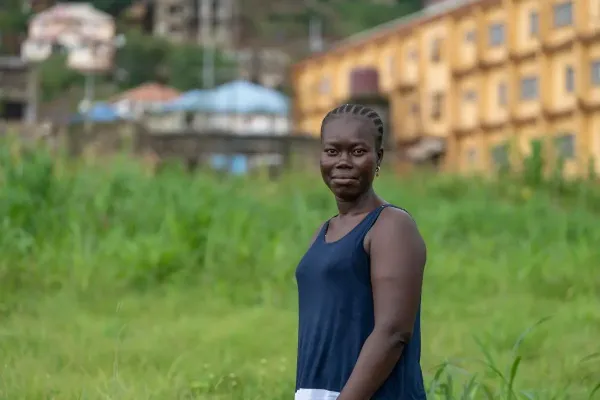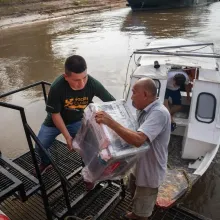Saio Kamara proudly holds a yellow, pocket-sized paper and with a smile tells those around her: “This is my TB certificate.”
It’s more than just a piece of paper. It marks a major milestone: being cured of multidrug-resistant tuberculosis (MDR-TB). The document includes details, such as her diagnosis, treatment type, and, most importantly, her completion date: March 31, 2022. It’s a day she’ll never forget.
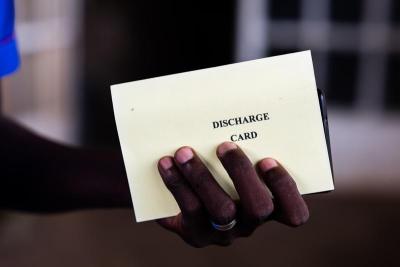
A TB treatment completion certificate photographed at Lakka Government Hospital in 2019.
Photo by John Lascher / Partners In Health Canada
It’s when, after more than two years of intensive inpatient and outpatient care, the now 29-year-old widow was reunited with her son and two daughters. Many patients with TB around the world don’t get to experience that moment—or proper care, at all. But the situation is far different at Lakka Government Hospital in Sierra Leone, where the cure rate for MDR-TB is around 75%. Globally, the average is less than 60%.
“If I ever tell anyone I was a TB patient, they don’t believe me, because look at me now. I’m happy and strong,” says Kamara, who couldn’t stand by herself when she was admitted.
Meet Dr. Girum B. Tefera in the video above. For many years, he has treated patients with MDR-TB—from his home country of Ethiopia to now Sierra Leone. Since 2019, he has led MDR-TB care at PIH-supported Lakka Government Hospital.
High-quality, patient-centered care
TB is the deadliest infectious disease in the world despite it being treatable. The incidence of TB also reveals glaring health care inequalities, as more than 95% of deaths occur in developing countries, including ones where Partners In Health (PIH) works. And Sierra Leone has one of the highest burdens of the disease, which is why PIH is committed to improving care for patients there.
Since 2017, when PIH began supporting and renovating the facility, Lakka Government Hospital has led the way in MDR-TB care. It has had many firsts: the first MDR-TB treatment center in the country and, most recently, the first country in the world whose Ministry of Health accepts a shorter, six-month MDR-TB regimen for nationwide use.
The longer regimen, which Kamara completed, included more than 15 tablets per day for two years. Now, the regimen offered is between five to seven pills per day for six months.
While medication is a key part of care, support at Lakka Government Hospital extends beyond pills.
When a patient is admitted to the hospital, one of the first people they meet is a social worker, such as Sarah Kamara, who speaks with them to better understand their needs.
“Most [patients] when they come in are destitute. Their family members or maybe neighbors just come and dump them. They just leave them here. So, 9 out of 10 [patients] need extra, extra social support,” says Kamara, who shares the same name with Saio Kamara, but is not related. “Some have no clothes, bed sheets, toothpaste, gloves, or soap. Most of those things, PIH provides for them.”
Sarah Kamara and a psychosocial counselor go room-to-room every day to check on patients at the 140-bed hospital, of which only about 50 are currently functional following infrastructure renovations. They provide encouragement, basic counseling, and dispel misinformation.
Saio Kamara heard those stories, too, about the previously run-down hospital. Community members told her she wouldn’t survive if she went there.
“But when I came, the nurses, the doctors, and PIH took care of me,” she says. “[They] talked to me, advised me, and made me take my medicine.”
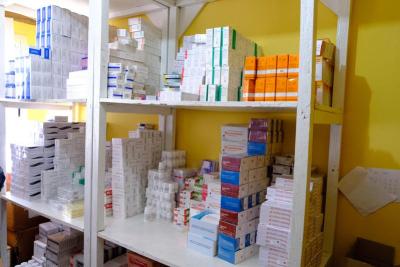
A well-stocked pharmacy at Lakka Government Hospital. Modern medication is necessary for MDR-TB treatment, but not sufficient on its own. It must be combined with proper nutrition and social support.
Photo by Maya Brownstein / Partners In Health Canada
Even after being cured and discharged with a TB certificate, her uncle and loved ones were skeptical. So much so that they kicked her out of the house because of her cough. She immediately returned to the hospital to seek support. Yet again, PIH stepped in to help by providing a free, short-term apartment.
That type of care isn’t a one-off situation. At Lakka Government Hospital, staff will do whatever it takes to make patients well. Sometimes social support includes money for school fees or food to bring home; it’s a personalized package.
Addressing Challenges
But there are challenges too.
Patients with MDR-TB stay at Lakka Government Hospital for a month, at minimum, and often much longer. While staff try to keep patients engaged and mentally healthy, many struggle with depression and other mental health conditions. And there aren’t yet any daily recreational activities, TV, or other forms of entertainment to keep patients occupied. Knowing all this, staff are focused on stabilizing patients and helping them reach a point in their care when they are no longer contagious, allowing them to re-enter their communities and visit the hospital as outpatients through the rest of their treatment regimen.
Perhaps the most pressing challenge is the lack of an ambulance. There’s one, but it’s only allowed to transport patients to another facility for tests not available at the hospital such as X-rays, CT scans, or ultrasounds. An ambulance—dedicated to transfers—is needed to bring patients who need specialized care to other facilities.
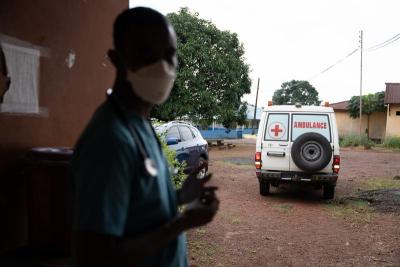
The single ambulance at Lakka Government Hospital, which became the first MDR-TB referral facility in Sierra Leone in 2017.
Photo by Caitlin Kleiboer / Partners In Health Canada
Advancing the model of care
Despite these challenges, care is improving. There are now three MDR-TB treatment centers in the country, including one at PIH-supported Koidu Government Hospital in Kono District and another in Makeni, which is supported by Médecins Sans Frontières. The goal is to create additional MDR-TB facilities to expand and decentralize access to care for the country’s 8 million residents. For that to become a reality, more specialized staff—among other things—are needed.
PIH staff currently work with the Ministry of Health staff at the facility level by providing on-the-job training and intensive workshops on MDR-TB care. Additionally, at the national level, the team provides technical assistance to partners in Sierra Leone’s National TB Program by helping to develop protocols for care and update guidelines.
In partnership with the government, PIH is paving the way for more people like Saio Kamara to recover. Since 2017, more than 900 patients with MDR-TB have received free services at Lakka Government Hospital.
“When you come here,” says Sarah Kamara, “we want to see you leave here healthy.”
